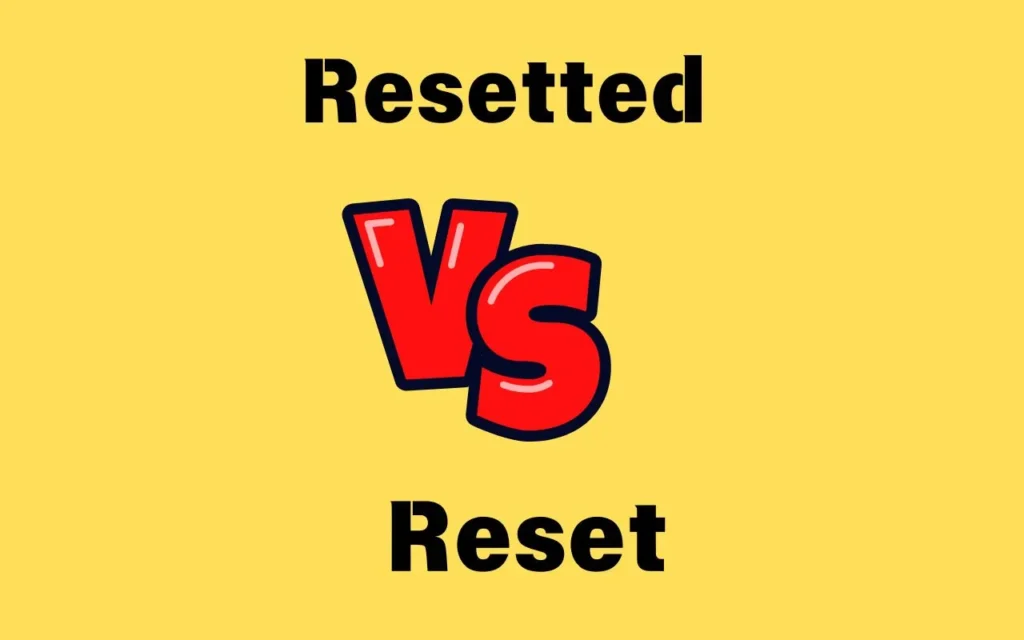Last updated on May 3rd, 2025 at 04:23 am
English grammar can be tricky, especially when dealing with irregular verbs. Words like reset often lead to confusion because they don’t follow the typical patterns of regular verbs.
Is the past tense of reset “reset” or “resetted”? Let’s explore the rules, correct usage, and common mistakes to ensure you never stumble over this verb again.
Understanding the Irregular Verb “Reset”
The word reset is an irregular verb, meaning its past tense does not follow the conventional rule of adding “-ed” to the base form.
- Definition of Reset: To set something again or restore it to its original state.
Example: “I reset my alarm clock every night before bed.”
Unlike regular verbs, reset retains the same form across the present, past, and past participle tenses. This can make it tricky, as people may incorrectly assume that “resetted” is a valid past tense form.
Is it “resetted” or “reset”? Learn the rules of this irregular verb and discover why “reset” is the correct past tense in English grammar.
The Correct Past Tense Form of “Reset”
The correct past tense of reset is reset.
- Present Tense: I reset the machine.
- Past Tense: Yesterday, I reset the machine.
- Past Participle: I have reset the machine.
Why doesn’t it change?
The verb reset belongs to a group of irregular verbs known as “zero-change verbs,” where the base form, past tense, and past participle remain identical.
Other examples of such verbs include:
- Put → Put → Put
- Cut → Cut → Cut
- Hit → Hit → Hit
Reset vs. Resetted: Grammatical Clarification
Is “Resetted” Ever Correct?
No, resetted is not a grammatically correct word. Adding the “-ed” ending is unnecessary because reset already serves as the past tense form.
Common Mistake:
Incorrect: I resetted the router yesterday.
Correct: I reset the router yesterday.
Using resetted not only breaks grammatical rules but also creates confusion. It’s essential to stick to the standard irregular form: reset.
Pronunciation and Usage of “Reset” in Different Tenses
While reset doesn’t change its spelling across tenses, its pronunciation stays consistent as well: /ˈriːˌsɛt/.
Here’s how it appears in different contexts:
- Present Tense:
Example: “I reset the password every month for security.” - Past Tense:
Example: “She reset her phone to factory settings yesterday.” - Past Participle:
Example: “They have reset the clocks for daylight saving time.”
To avoid confusion, focus on the context of the sentence to determine the tense being used.
Common Mistakes and How to Avoid Them
Mistakes often arise when people incorrectly assume that all verbs must conform to regular patterns. Here are some common errors and ways to avoid them:
Mistake 1: Using “Resetted” as the Past Tense
- Why it happens: Regular verbs like “restart” (restarted) may cause learners to apply the same rule to reset.
- How to avoid it: Remember that reset is irregular and doesn’t change form.
Mistake 2: Misinterpreting the Tense of “Reset”
- Why it happens: Since the word looks the same in the present and past tense, readers or listeners might misunderstand the time frame.
- How to avoid it: Use context clues like time markers (yesterday, last week) to clarify the tense.
Mistake 3: Overcomplicating the Verb
- Why it happens: People assume irregular verbs are “harder” to use, leading to overthinking.
- How to avoid it: Keep it simple—reset is the correct form for all tenses.
Expanding Your Grammar: Similar Irregular Verbs
To master irregular verbs like reset, it helps to compare them with others that follow similar patterns. Here’s a quick list:
| Base Form | Past Tense | Past Participle | Example Sentence (Past Tense) |
|---|---|---|---|
| Set | Set | Set | I set the table before dinner. |
| Cut | Cut | Cut | She cut the paper into shapes. |
| Hit | Hit | Hit | He hit the ball out of the park. |
| Let | Let | Let | They let the dog out earlier. |
| Shut | Shut | Shut | I shut the door when I left. |
Pro Tip: Irregular verbs often follow unique rules, so it’s best to memorize them through practice and examples.
FAQs
What is the past tense of “reset”?
The past tense of “reset” is simply “reset.” It doesn’t change in form like regular verbs.
Is “resetted” ever correct?
No, “resetted” is grammatically incorrect. The correct form is “reset” in both the present, past, and past participle.
Why doesn’t “reset” change in the past tense?
“Reset” is an irregular verb that belongs to a group of verbs where the base form, past tense, and past participle are the same.
How can I avoid confusing “reset” with “resetted”?
Focus on recognizing “reset” as an irregular verb, and avoid adding “-ed” to it in the past tense.
Can you give examples of “reset” in sentences?
Present Tense: “I reset the device.”
Past Tense: “She reset the system yesterday.”
Past Participle: “They have reset the router.”
Are there other irregular verbs like “reset”?
Yes, other irregular verbs like “put,” “cut,” and “hit” do not change forms in the past tense.
Conclusion
The past tense of reset is simply reset—not “resetted.” Understanding its irregular nature is crucial for accurate communication, especially in written English.
While irregular verbs can be challenging, recognizing patterns and practicing similar examples will help you avoid mistakes.
Now that you’ve mastered reset, why not explore other irregular verbs? Share your thoughts or questions in the comments below!





